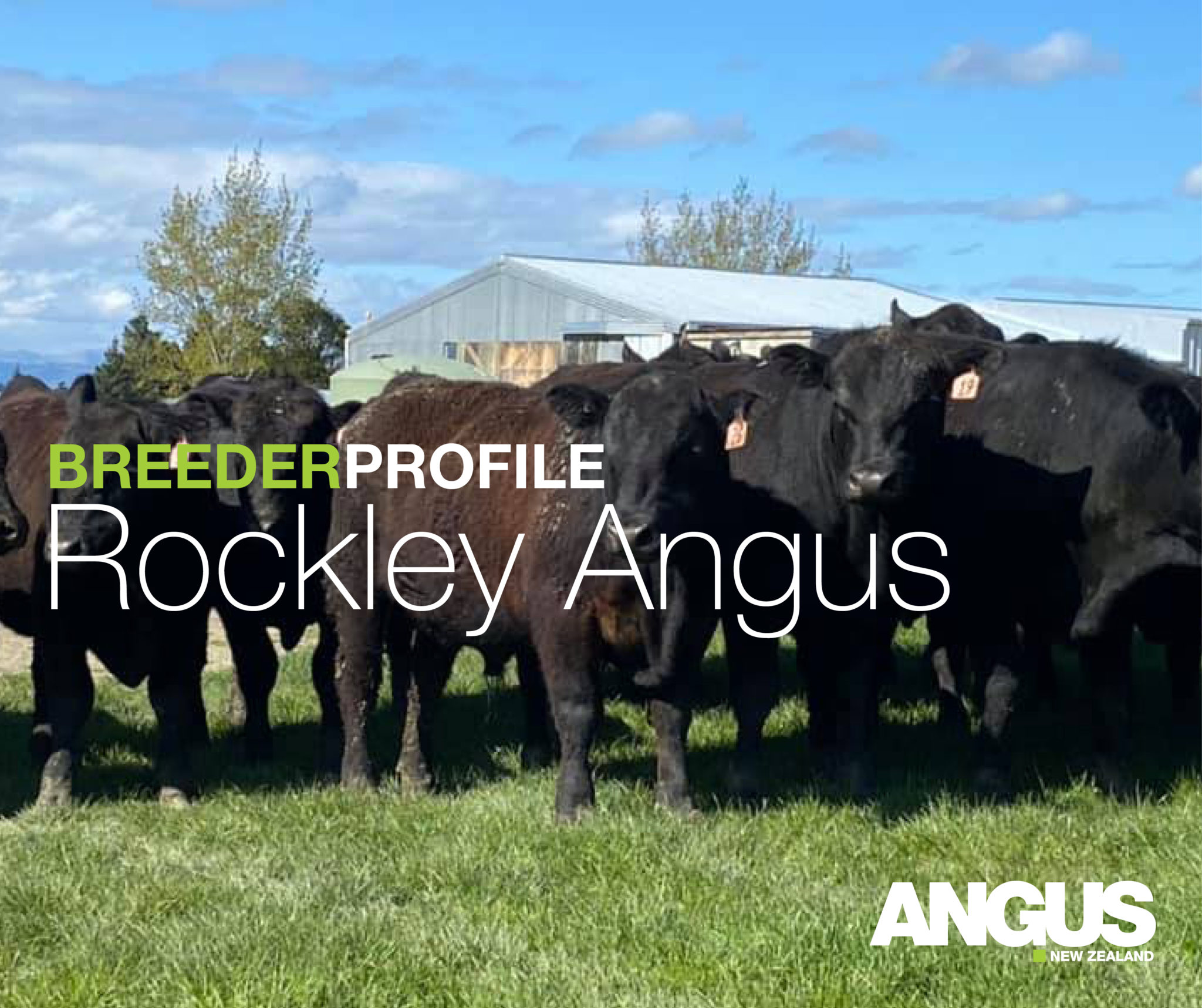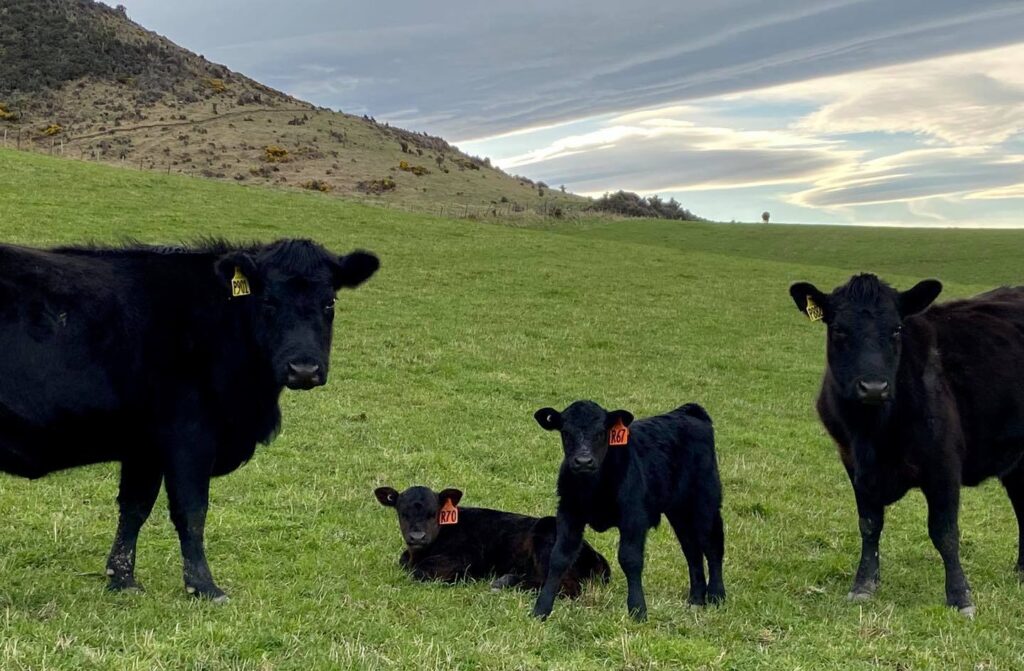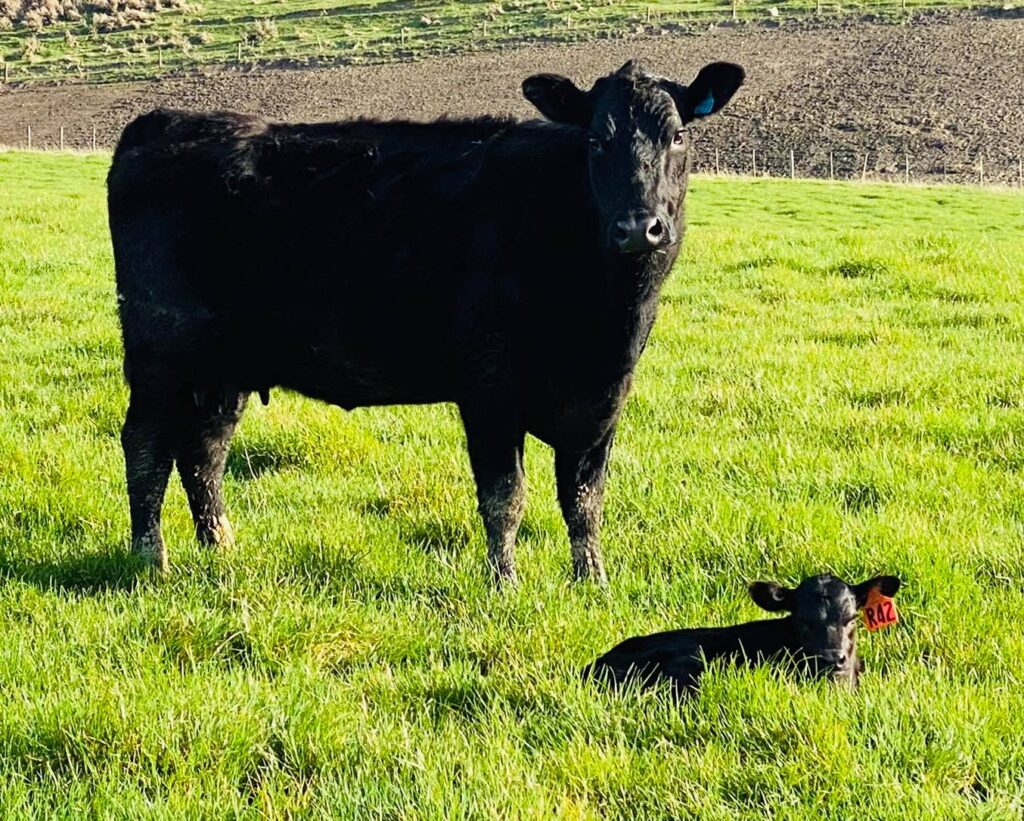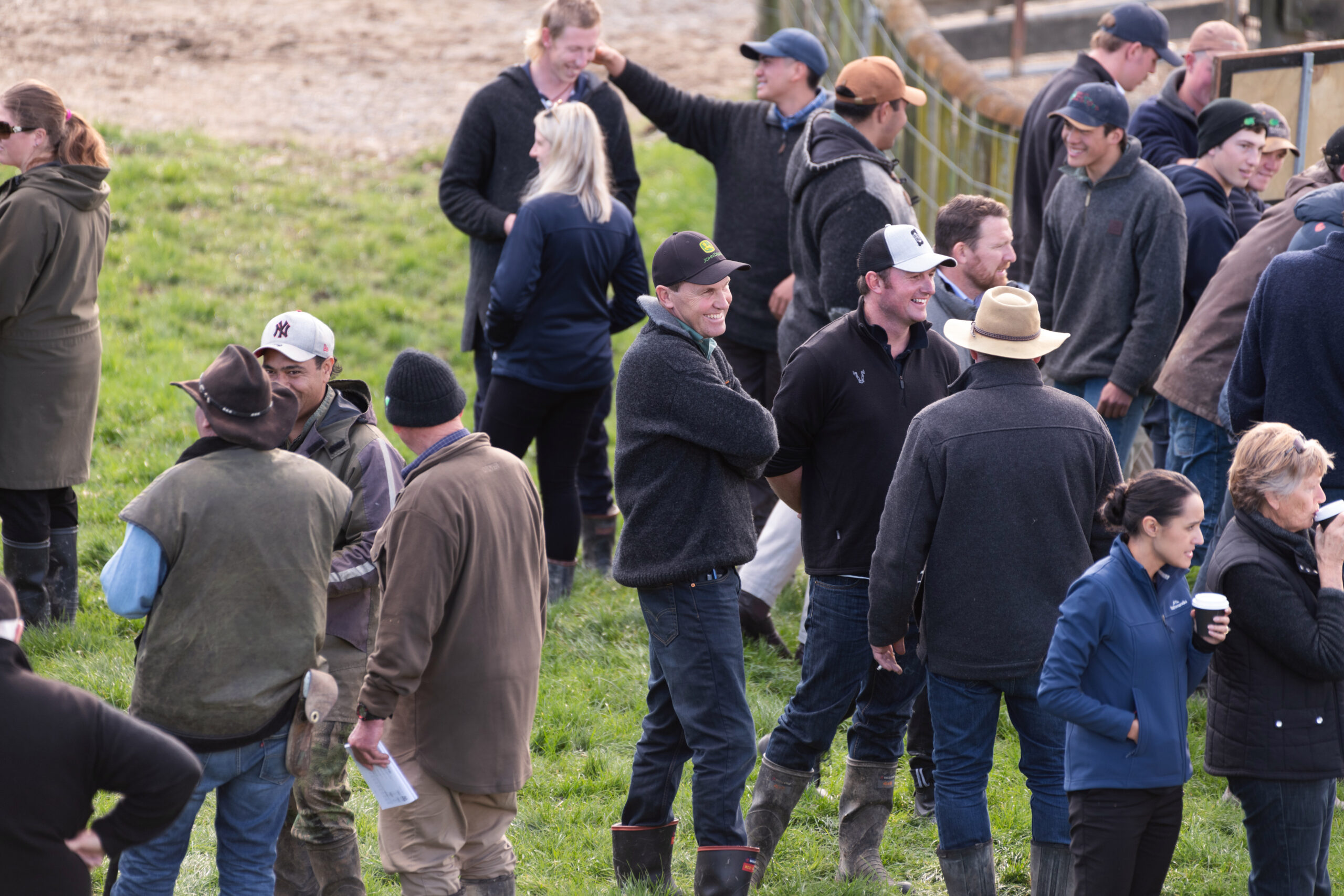
ROCKLEY
ANGUS
FOR BETTER BALANCED BEEF
Breeder Profile:
Katherine & Philip McCallum
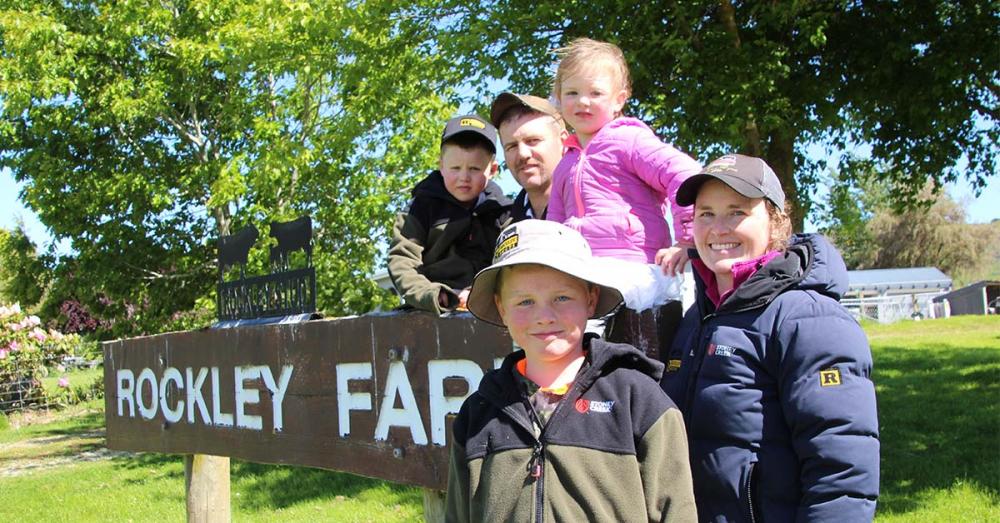
FARMING CAREERS PACKED FULL OF GROWTH AND DEVELOPMENT FOR SOUTHLAND FAMILY
Katherine and Philip McCallum are in the Angus breeding business for the long haul.
Katherine registered the Rockley prefix when she was 16 with a couple of Angus heifers her grandparents gave her from their Lora Angus Stud.
The young couple have packed a lot into their farming careers, have covered a lot of ground and experienced some significant milestones along the way.
With the support of family, they own two farming businesses (before they’re 40), have just hosted their fourth on farm bull sale and are one of about 25 Angus studs with 5-star completeness of recording to their credit.
The couple, along with sons Tim, 10, Zac, 7 and daughter Emma, 4, farm at Balfour in Southland.
They sell all their bulls as yearlings with a focus on calving ease and heifer mating with a balance of EBVs.
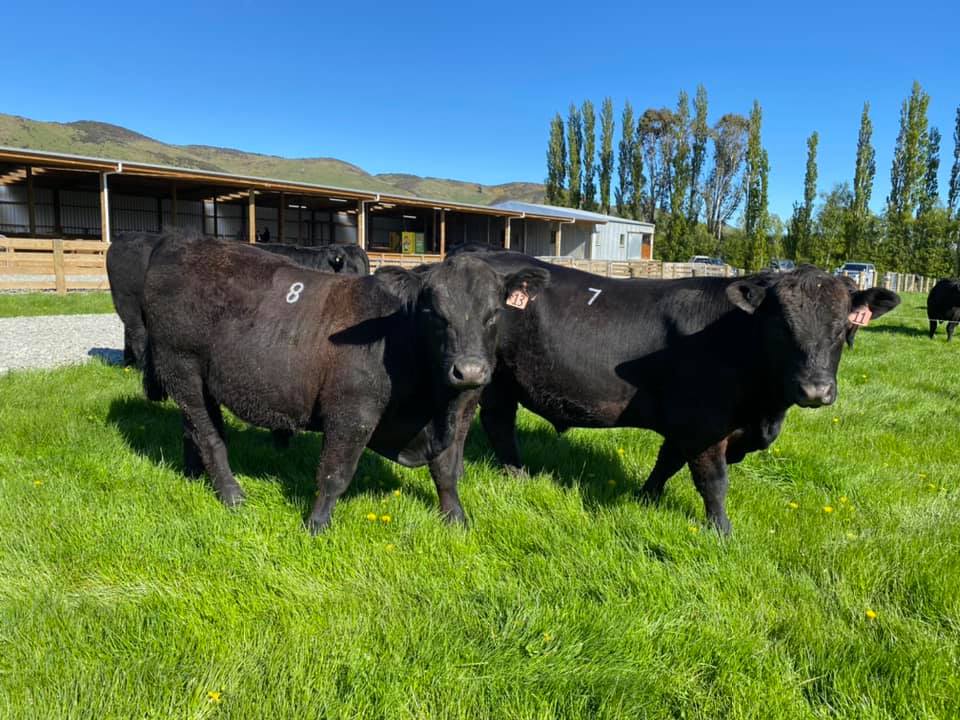
Rockley Angus yearling bulls 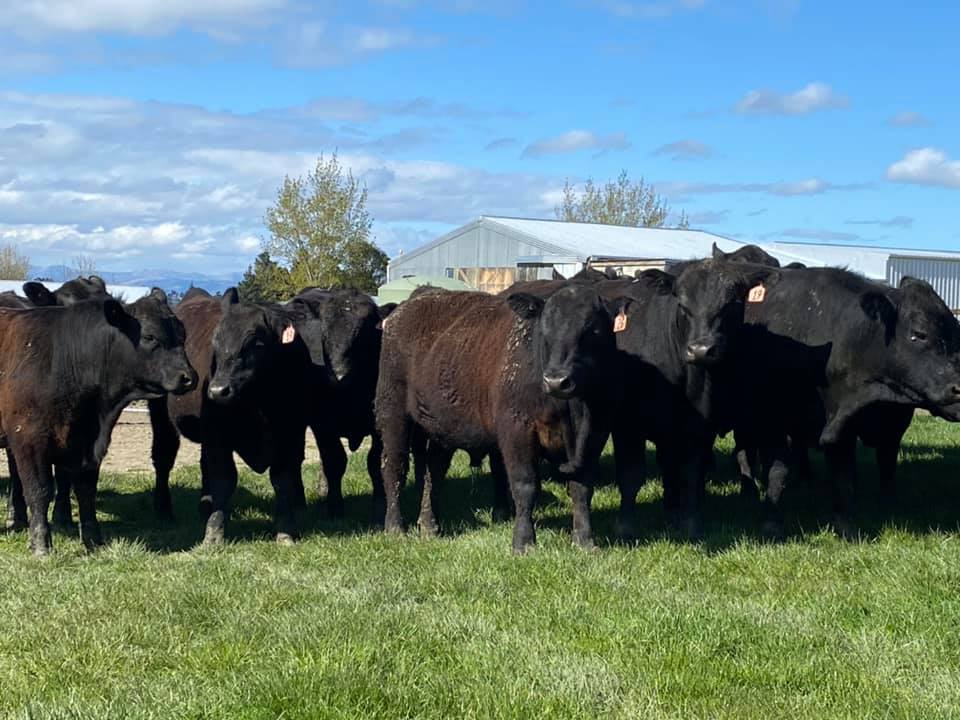
Their farm business is run on 290ha effective on flat to rolling country with some steeper hills. The Balfour property (they bought from Katherine’s parents) carries 94 stud cows, 50-60 yearling bulls, 110 mixed aged ewes, 300 hoggets 168 R1 dairy heifers and 150 R2 dairy heifers.
Then there are the 500 dairy cows they winter. These cows come from the 650 strong dairy herd from their diary farm, overseen by a contract milker with plenty of hands on support from Philip. This property is at Mandeville and was purchased from Philips parents earlier this year through succession planning.
“All the stock classes can be a juggle, but we run our yearling heifers with the diary heifers for mob size and ease of management,” she says.
Most of the McCallum’s clients are beef farmers and Katherine says while they are targeting heifer mating with their bulls, some clients use them over cows as the bulls are forward enough to do that job with ease.
Combined with the selection of genetics for low birthweight and calving ease, temperament has a big role to play at Rockley.
Katherine says temperament is important because they have a young family and working with quiet cattle is less stressful for everyone.
“It’s good to have quiet yet maternal cows for when we tag and weigh calves at birth.”
“We didn’t realise how important temperament is until we bought some cows from The Downs Stud of Wayne Chisnall in Canterbury eight years ago.”
She says they both realised they didn’t have to put up with some of the behaviors they had in their original herd. They said it’s not until you’re exposed to the behavior of other cattle that you realise the difference.
Temperament is something that is always worked on in the Rockley stud, as new sires can introduce unwanted temperament and the couple say selective culling is important.
“It is all part of our learning and developing the stud,” she says.
Katherine says stock-skills play a part in temperament – she said some people can inadvertently create a stressed animal without realizing it. This comes down to understanding stock behavior.
Katherine says the Angus stud has grown for them in recent years, especially with the purchase of The Downs cattle and earlier this year the purchase of 19 in-calf heifers from the Te Atarangi Stud in Northland.
“It was slightly more of a hobby before then, but it’s serious and been a gradual build up. We’re in it for the long race.”
Her passion for breeding was ignited further when she was selected to travel to Australia for the Angus Youth agribusiness course in January 2019 and being part of the trans-Tasman exchange in 2008 – both opportunities have led to networks and relationships throughout Australasia.
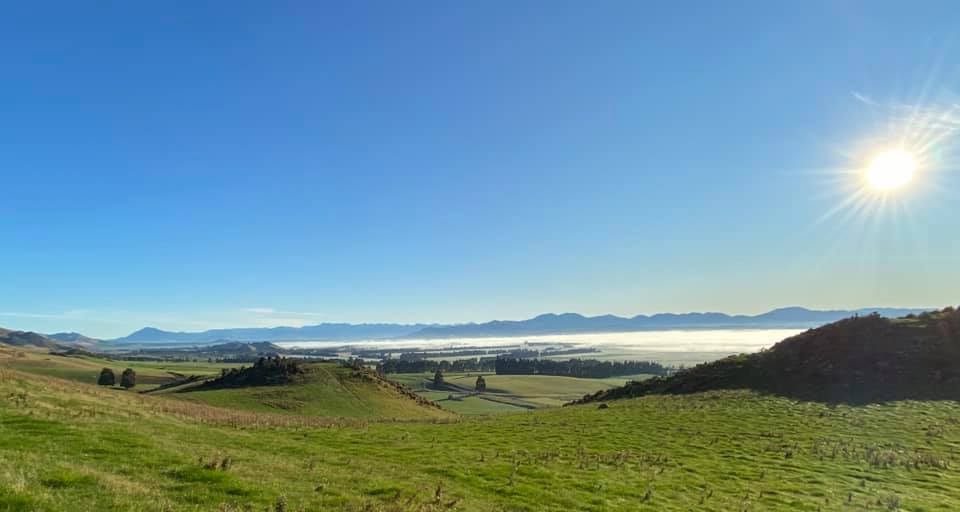
SUSTAINABLE BUSINESS GROWTH UNDERWAY
In mid-October the couple hosted their fourth on-farm sale. Katherine confesses it was a big leap to hosting on-farm sales, but says they have good support and work closely with their stock agents.
They largely rely on Facebook and local advertising to help raise awareness of the stud and the bulls and word of mouth.
“We are building our clients up slowly. We have really good agents who support us, our local agent Mike Gill and our studstock agent Callum McDonald and we catch up with them a few times a year. The communication with them is really important.”
“That and sticking to our breeding goals. I do ask clients for feedback and I want them to come back because of the cattle. I have been trying to visit our clients so I can understand their management and goals, but Covid-19 stopped that this year. We are honest and offer our clients support with NAIT, EBVs and structural soundness if they want it.”
This year the family offered just shy of 20 bulls at auction and say they didn’t quite have enough to meet the market which contributed to a strong average sale price of $4900. Any bulls that aren’t selected for sale are used over the dairy cows at the Mandeville farm to follow up after AI, then tidy up some pastures at the dairy farm before being sent to the works.
“This year was an awesome sale; we needed more bulls so will aim to lift sale bull numbers next year. But we’re not sprinting in regards to the development of our stud, we want to make sure we have the right amount of the right bulls at the right price.”
ATTENTION TO DETAIL PAYS OFF WITH PERFORMANCE RECORDING
From the get-go of the Rockley Stud they have recorded as many traits as they can and it’s paid off with the status of 5-star completeness of recording awarded to them.
“To us that’s really important with selling our bulls as yearlings.”
An EBV package with high accuracy is Katherine’s preference. She said there’s nothing worse than buying a bull who has the figures and look you want, only for those figures to change drastically once he’s run with the females and has progeny on the ground.
To help improve the accuracy of the Rockley bulls the McCallums invest in HD50k DNA testing with all cows and progeny tested in the past five years.
“It’s not cheap, but it’s really important for us – we don’t have big numbers and each cow needs to be here for a purpose. We’re happy to spend that money if we can see the results.”
That philosophy also applies to other areas of the farm. For example, they have spent the past few years improving the sheep yards her father and late grandfather built.
“Good infrastructure is safer and it’s a better environment to work in – there’s a beneficial output. Philip also has decent machinery; he needs to cover the ground when the weather is good down here.”
When it comes to sourcing sires to use over their own cows, Katherine says they are disciplined in their selection. The Angus NZ average EBV for birth weight is +4.3 and the McCallums seek out bulls below that.
“The breed average for calving ease direct and calving ease daughters is +1.6 and +1.9 respectively. For us both must be +5 or better.”
She and Philip also try to learn about where the bulls have come from and what the stud management and values are.
“Those are just as important to us as the bull himself.”
“We are trying to breed yearlings that will move forward and fit our client’s goals.”
She said they target studs with a 4.5 to 5-star completeness of recording rating, good calving ease and low birthweights.
“We have to be disciplined when we source sires.”
The pair say their breeding goals developed through what they were doing on their own farm.
“Having different farming enterprises means stock classes have to work together. We could grow our bulls to yearlings really well so decided to sell them as yearlings rather than compete on the two-year-old bull market.”
“From there we decided to focus on calving ease and low birth weight, similar to what Chris and Karren Biddles do in Northland, but with our own take on it,” says Katherine.
She says they do a lot of looking around for bulls to use in their own herd and might only find one or two that suit in a season.
“It’s that discipline that’s helping us,” she says.
LEGISLATION CREATES ON-FARM CHALLENGES
The biggest challenge Katherine says she and Philip are facing on their property are not weather or animal health issues – rather challenges stemming from central Government – namely the freshwater reforms.
They currently winter a lot of the stock, in particular the dairy cows, on winter crops to help their livestock through the long-wet Southland winters, but pressure from Government is mounting.
“It’s wet in Southland and we have always tried to follow new regulations and implement best practice – we work hard to do that. Philips Father is a councilor for Environment Southland. But these new regulations are going to affect all Southland farmers.
“If they are enforced, we will have to look at other ways of feeding stock in the winter.”
“We are currently working on looking at how to meet regulations for the future and how we feed our stock in the winter”. This may mean a grass wintering system or even looking at options into a wintering barn for the dairy cows.
Katherine says they typically plant and feed forage crops such as swedes, Fodder Beet and kale but she says if the new regulations are enforced, they will need more land on which to grow grass to feed their existing livestock numbers.
She said the crop planting date of November 1 is near impossible.
“I was talking to a farmer the other day and he had 250mm of rain in September alone – planting crops in wet ground isn’t good practice, it causes compaction, it’s not good for the soil.”
“The hammering farmers get in the media isn’t great either. Farmers need a positive voice to get across to urban people to help them understand more about farming.”
For them, Katherine says the environmental regulations will mean they either sink or swim.
“We are sticking to our guns this year because of the grandparenting rule, but we are looking for the opportunities (to meet the regulations) and are doing our research.”
The grandparenting rule means that if you have been winter cropping in the past you can continue to for a transitional period without consent.
EMBRACING SUSTAINABLE PRACTICES
While the fresh water reform regulations are a pending challenge, Katherine says there’s been a lot of sustainable practices in place on the property for a number of years – starting with her father’s work in riparian planting.
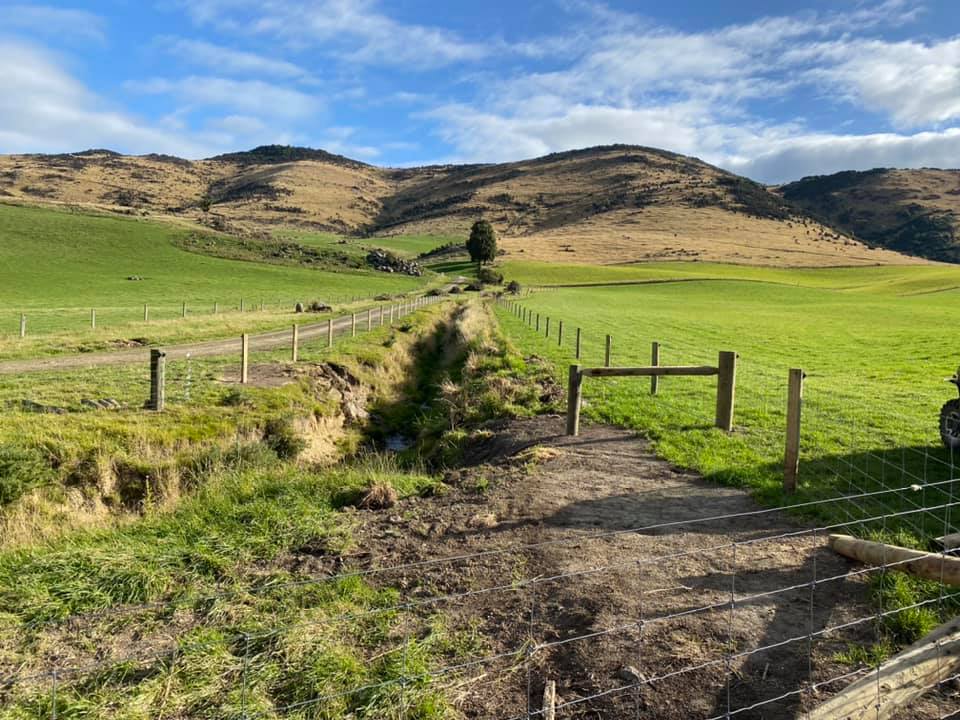
“Most of our waterways are fenced off and there’s a lot of riparian planting. We also have some strategic tree-lanes. Dad started that and we’ve carried on.”
The couple say gorse control is a constant project as well as pest control.
“We have a lot of native bird life and creeks that runs through the farm. The kids love hunting for yabbys and fresh water crayfish.”
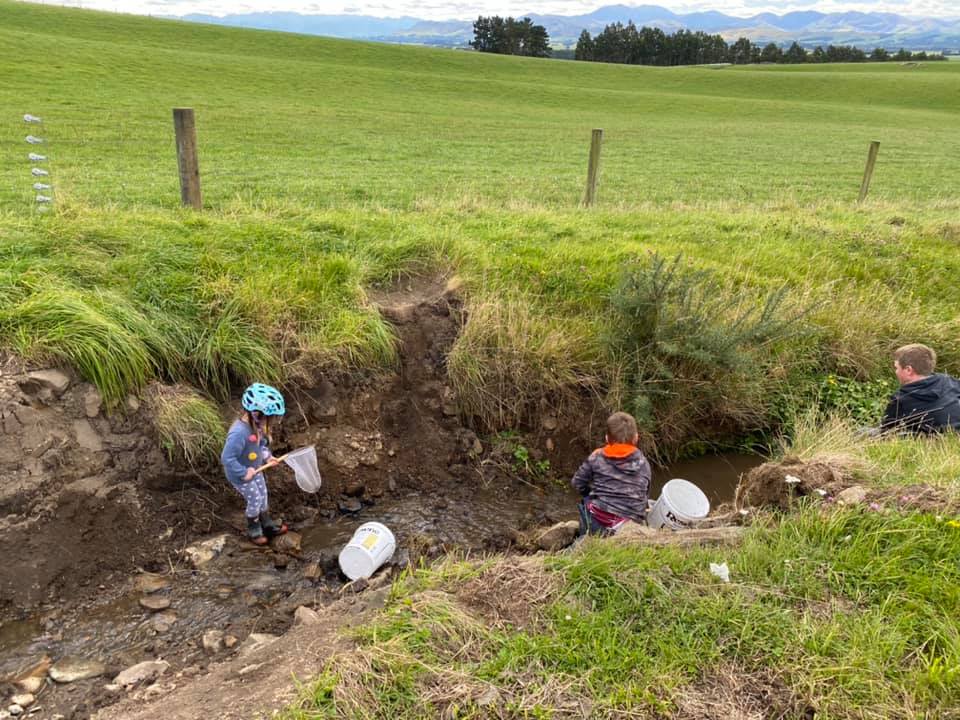
On the dairy platform investigation is underway into a centre pivot for more effective use of water. Katherine says that they have been looking at low growing plants so the pivot can easily move over the top.
As well as sustainable practices the McCallums have embraced on-farm technology.
They use the mobile phone app called Resolution, by Top Rail for their animal health records, it holds a farm map and it can be loaded with tasks for different team members to do.
Phil and Kath are both involved in a RMPP discussion group, RMPP Beyond The Farm Gate which involves local farmers and a range of speakers including a Lean Farm Management course. From this she is putting their animal health plan into monthly tasks as well as other key tasks, such as tractor work, preparing for the dairy grazers and when animal health tasks are due.
They use the Gallagher HR5 and TW3 reader for weighing and reading tags in the yard with that data uploaded into StockBook, which is then fed into TACE (formerly Breedplan).
Katherine says the weigh system is an important tool and they don’t like to muck around. “We like having good systems.”
She says Philip made up their calf weighing trailer, largely from recycled items from around the farm.
“It’s not flash but it works well,” she says.
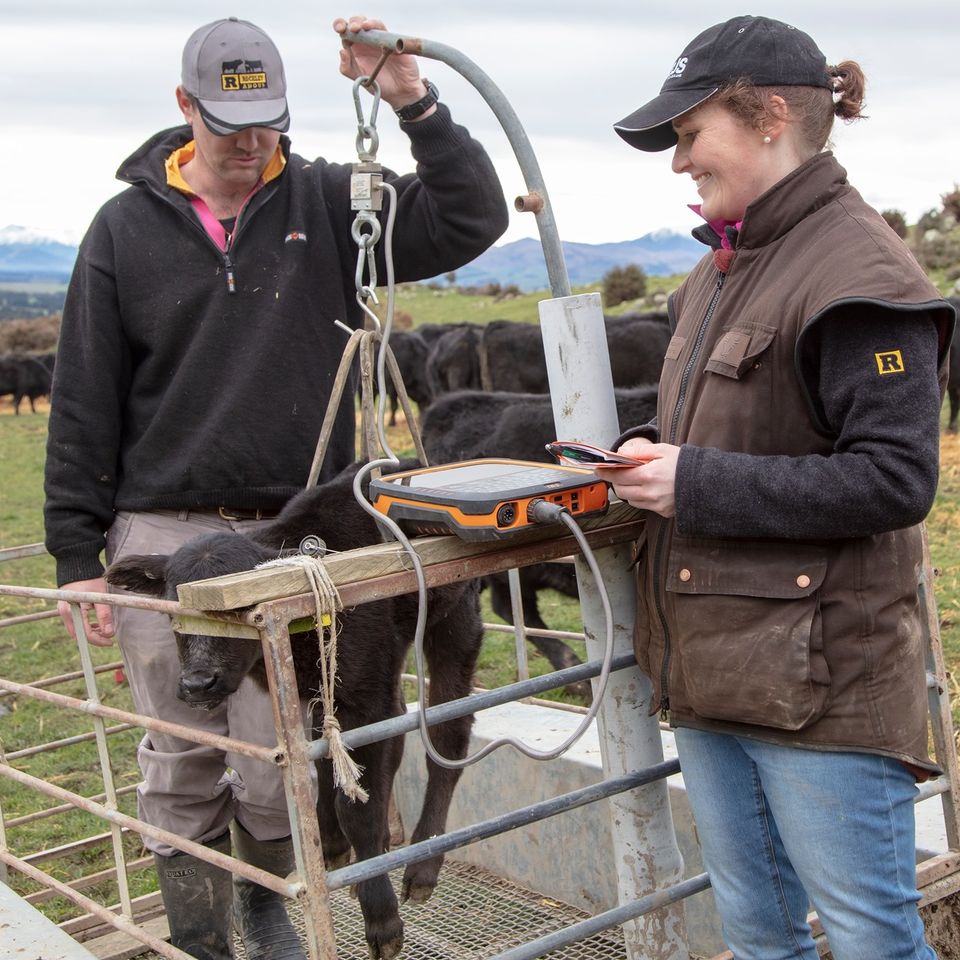
She says she and Philip work together as a team with him handling the day to day management of the properties while she takes care of the admin, recording and EBVs.
“We make a good team.”
“We’re still learning heaps and growing and we have a long way to go with having the right females and getting the balance right – but we are making sure we also look at the bigger picture. There’s some really good breeders in the Angus Society and we are getting alongside and learning from them.”
To find out more follow Rockley Angus on Facebook.

